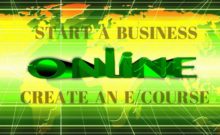For your online business you have worked out you want to create an e/course and now it’s determining the type of the e/course it’s going to be. This is an all important thing to work out first after you have decided you want to go ahead and create your own e/course and done a little research on the industry (see part one ) of this three part series you will be getting into.
WHAT TYPE OF E/COURSE IS BEST FOR ME?
If you are thinking of creating your own e/course here’s some of the things worth taking into consideration regarding the type of e/courses there are out there.
- First there are different types of e/courses, so you need to consider the type of E/course that suits you and what you want to do. The courses can differ according to the creators teaching style, and authority, and creativity methods they use.
The training and information given may all cover what you need to know to create a top e/course however it’s important to consider which course training style connects with you. This can be determined for example often by the background of the course instructors, the age group, the demographics, and presentation of the course in how it is structured to meet the particular type of customer or target audience that the creator or instructor is aiming for to reach and connect with and the type of platform in which they decide to present and showcase their course.
- Also how big is your e/course going to be? This means for example determining the amount of modules you want to have in the course and topics for each one. The course may only have four modules however it may have eight topic or chapters to each module, or alternatively it may have 8 to 10 modules covering three of four main topics. So this comes down to looking at the length of the course as well in terms of how long you can put towards each week the time to work on your E/course.
- Next is deciding on the standard of the course you’re looking to create.
There are different e/course levels and prices can vary with the saying you get what you pay for a fairly accurate guideline of what comes with the course. However an e/course can be a top e/course on each level if it’s done right so it’s necessary to consider what material and quality you want to put into and make your course and how you’re going to present it.
Here is a look at the three main levels:
Basic: The course doesn’t have a lot in it with perhaps only an e-book or report, generally no list of resources or very few given. It may be up to one or two or may be four short modules at most which only outline really the main steps of the course subject.
Next you have the intermediate level:
This level covers each main step more in detail and can have one or another good presentation method, with perhaps content being a mixture of video and text, however you may find it doesn’t come with one-on-one training and there may or may not be a Facebook group. It can offer some limited resources but here again if the course is done well it means it is of a fairly good standard.
The last level you have is the top level:
At this level you would expect a variety of different teaching methods and material to be given such as for example videos, and templates, plus diagrams and worksheets and additional media such as audio as well written content. Here the emphasis may be on providing multiple ways of meaningful communication to engage your students and keep the activity and learning experiences up. There will be a facebook group or inside exclusive members area and quite often a weekly discussion and answers/questions session where the course instructor engages and or has special guests or other instructors come on and teach and answer questions also.
- Then there’s deciding on what extra skills and education will you need to learn yourself on top of what you already know? A good online training course about creating an online business and e/course should cover all you need to know for you to create a top e/course, however you most probably will discover as you go along that there are other skills of a personal/individual nature that you will need to develop as well. In addition you may want to consider what parts of your e/course once you have done your training that you might want to outsource, that you don’t like or have the time to develop the extra skills needed to do yourself, so that in the long run it makes your course not only of a higher standard but also frees up your time to focus on other important things and ways to upgrade and add more value to your course and members area.
What you want is to see not only in the training course you do to learn how to create a top e/course but also the one you create for your students in a course that covers everything from start to finish regarding each part of the process in the creation, and technology, and the marketing aspects. Also included should be support, along with one-on-one training, and coaching offered, and of course Facebook group and inter exchange between other members and yourself. In addition there may also be a guarantee given with the course. Also there’s quite often bonuses added to the course however they can be varied in how many and what the specific type of bonus are on offer.
Overall when starting an online business and working out your e/course, basically it can mean that initially you’ll be spending quite a bit of time doing self-education through online learning in how to develop and create your system so that it works and getting everything set up— then from there testing and fine tuning and tweaking bits and pieces here and there and ironing out the rough spots, until it starts to even out and the day to day operations once in place begin to run systematically—which on from there in turn frees up your time to focus on other aspects of the business such as outsourcing, and advertising, and perhaps adding a few addon products and doing further improvements where it suits and needs it.
If you want to find out more about e/courses visit Your E/course Blueprint.
_____________________________________________________________________




